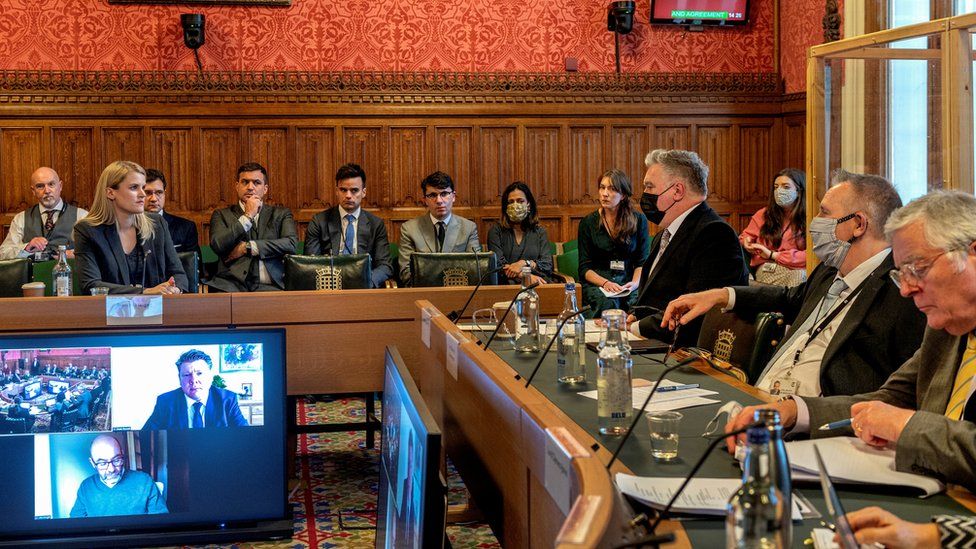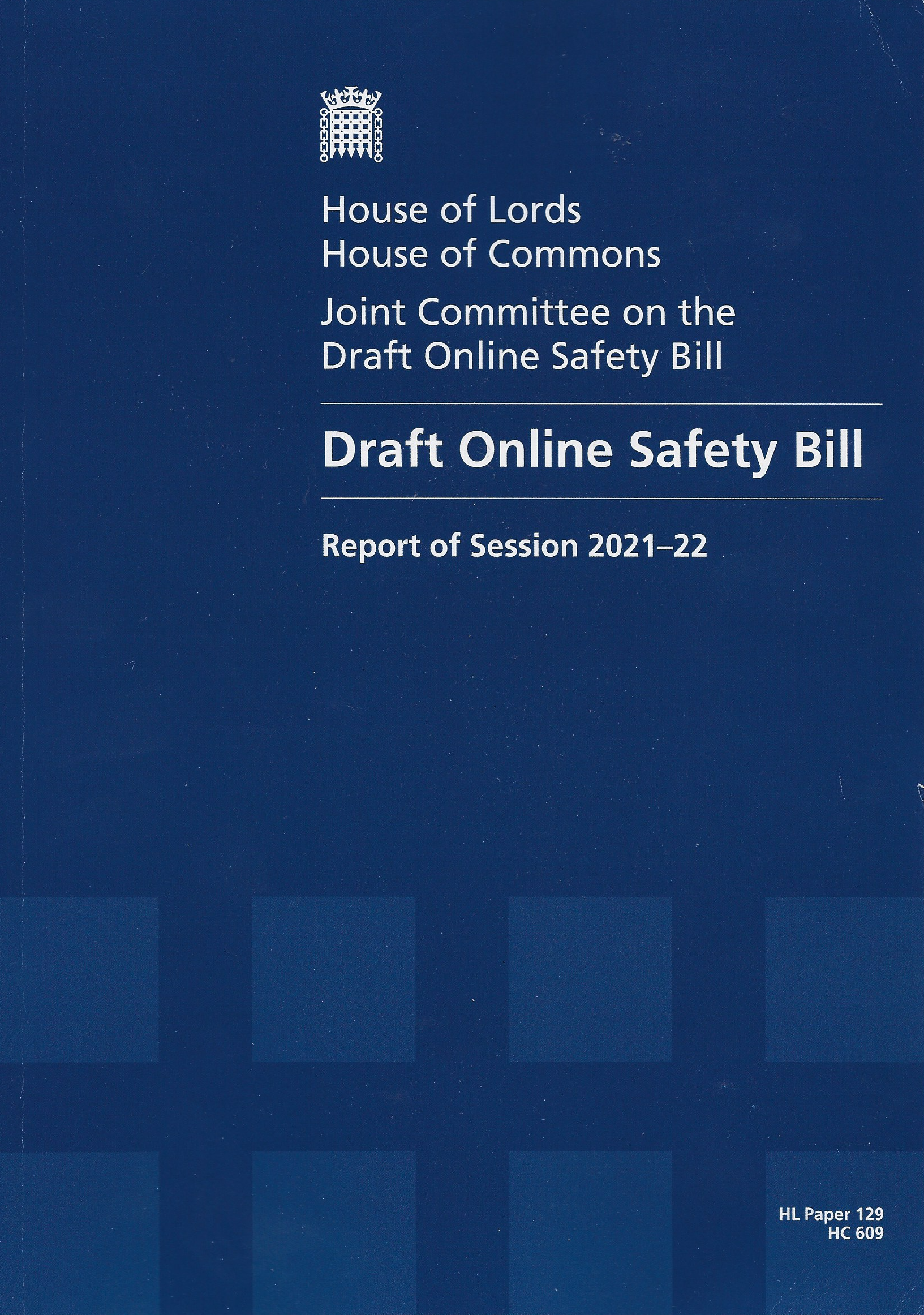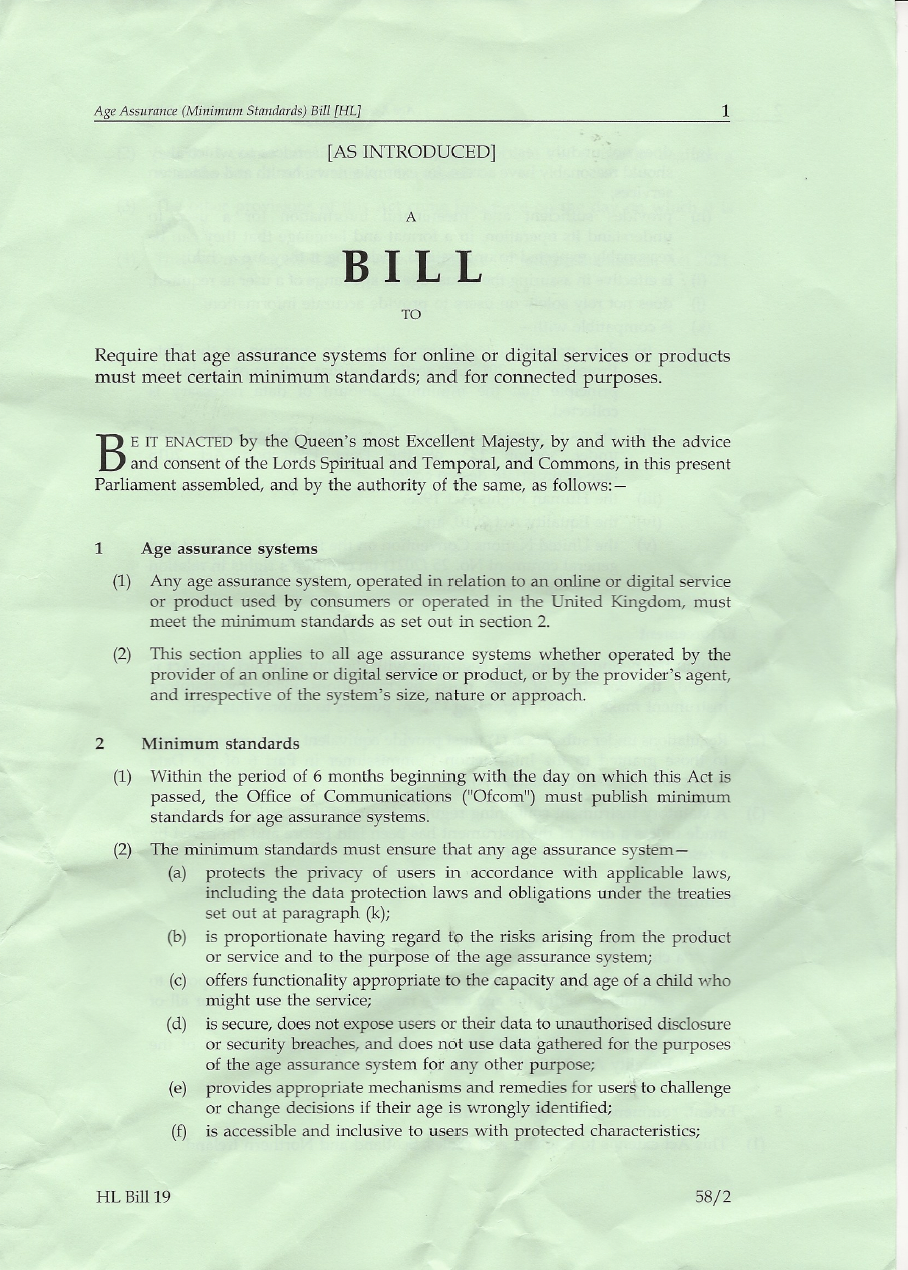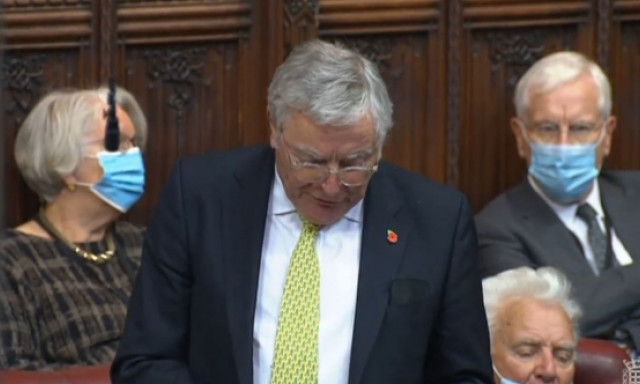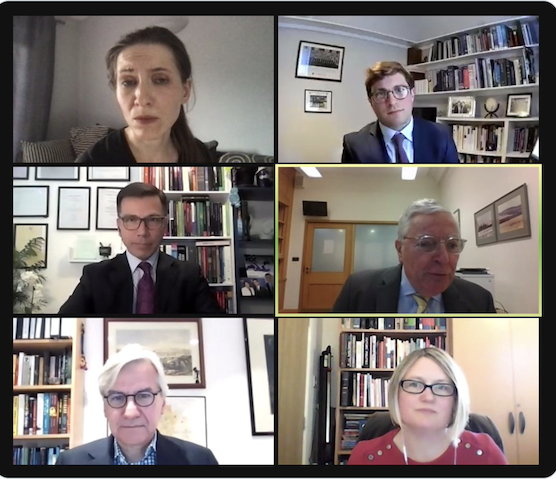Report of the Joint Committee on the Online Draft Bill: New offences and tighter rules
After 4 months work the Joint Select Committee on the Draft Online Safety Bill, with Damian Collins MP as our excellent Chair, has produced its report to generally favorable reviews
We have tried to ensure in our recommendations that the safety duties placed on Ofcom and the platforms are much clearer, by reference to existing and new, Law Commission recommended, offences and at the same time we do not infringe rights to freedom of expression. We have also recommended that paid for advertiing and online scams are included in regulated acctivity. We have recommended that it be made clear that all commercial pornography site be subject to the Age Appropriate Design Code aso that Age Assurance ensures that young people are are not subjected to unwanted online porn. We have also recommended that the role of Online Safety Ombudsman be established.
Here is the BBC summary
https://www.bbc.co.uk/news/technology-59638569
And here is the official parlimentary summary
https://ukparliament.shorthandstories.com/draft-online-safety-bill-joint-committee-report/index.html
The online world has revolutionised our lives
While the internet has created many benefits, underlying systems using data harvesting and microtargeted advertising have shaped the way we experience it.
Algorithms, invisible to the public, decide what we see, hear and experience. For some service providers, this means valuing the engagement of users at all costs, regardless of what holds their attention. This can result in amplifying the false over the true, the extreme over the considered, and the harmful over the benign.
The human cost of an unregulated internet can be counted in:
- mass murder in Myanmar
- intensive care beds full of unvaccinated covid-19 patients
- insurrection at the US Capitol
- teenagers sent down rabbit holes of content promoting self-harm, eating disorders and suicide.
The Online Safety Bill is a key step forward for democratic societies to bring accountability and responsibility to the internet.
We want the Bill to be easy to understand for service providers and the public alike. It should have clear objectives that lead into precise duties on the providers, with robust powers for the regulator to act when the platforms fail to meet those legal and regulatory requirements.
Online services should be held accountable for the design and operation of their systems and regulation should be governed by a democratic legislature and an independent Regulator—not Silicon Valley.
Four recommendations to strengthen the Bill
1. What's illegal offline should be regulated online
We agree that the criminal law should be the starting point for regulation of potentially harmful online activity, and that safety by design is critical to reduce its prevalence and reach.
A law aimed at online safety that does not require companies to act on, for example, misogynistic abuse or stirring up hatred against disabled people would not be credible. Leaving such abuse unregulated would itself be deeply damaging to freedom of speech online.
2. Ofcom should issue binding Codes of Practice
We recommend that Ofcom be required to issue a binding Code of Practice to assist providers in identifying, reporting on and acting on illegal content, in addition to those on terrorism and child sexual exploitation and abuse content.
As a public body, Ofcom's Code of Practice will need to comply with human rights legislation and this will provide an additional safeguard for freedom of expression in how providers fulfil this requirement.
3. New criminal offences are needed
We endorse the Law Commission's recommendations for new criminal offences in its reports.
The reports recommend the creation of new offences in relation to a number of harmful online activities.
We recommend that the Government bring in the Law Commission's proposed Communications and Hate Crime offences with the Online Safety Bill, if no faster legislative vehicle can be found. Specific concerns about the drafting of the offences can be addressed by Parliament during their passage.
4. Keep children safe from accessing pornography
All statutory requirements on user-to-user services, for both adults and children, should also apply to Internet Society Services likely to be accessed by children, as defined by the Age Appropriate Design Code. This would have many advantages.
In particular, it would ensure all pornographic websites would have to prevent children from accessing their content. Many such online services present a threat to children both by allowing them access and by hosting illegal videos of extreme content.
Ingredients for good higher education governance
I was recently asked by Advance HE to do a short piece reflecting on governance in the Higher Education Sector. It is reprinted in the Wilde Search publication Robust, Resilent and Ready: Assessing and Strengthening Governance in Charities and Education
https://www.advance-he.ac.uk/news-and-views/ingredients-good-higher-education-governance
https://www.wildsearch.org/pdf-robust-resilient-and-ready
Chairing a Higher Education institution is a continual learning process and it was useful to reflect on governance in the run up to Advance HE’s recent discussion session with myself and Jane Hamilton, Chair of Council of the University of Essex.
Governance needs to be fit for purpose in terms of setting and adhering to a strategy for sustainable growth with a clear set of key strategic objectives and doing it by reference to a set of core values. And I entirely agree with Jane that behaviour and culture which reflect those values are as important as governance processes.
But the context is much more difficult than when I chaired the School of Pharmacy from 2008 when HEFCE was the regulator. Or even when I chaired UCL’s audit committee from 2012. The OfS is a different animal altogether and despite the assurance of autonomy in the Higher Education Act, it feels a more highly regulated and more prescribed environment than ever.
I was a Company Secretary of a FTSE 100 company for many years so I have some standard of comparison with the corporate sector! Current university governance, I believe, in addition to the strategic aspect, has two crucial overarching challenges.
First, particularly in the face of what some have described as the culture war, there is the crucial importance of making, and being able to demonstrate, public contribution through – for example – showing that:
- We have widened access
- We are a crucial component of social mobility, diversity and inclusion and enabling life chances
- We provide value for money
- We provide not just an excellent student experience but social capital and a pathway to employment as well
- In relation to FE, we are complementary and not just the privileged sibling
- We are making a contribution to post-COVID recovery in many different ways, and contributed to the ‘COVID effort’ through our expertise and voluntary activity in particular
- We make a strong community contribution especially with our local schools
- Our partnerships in research and research output make a significant difference.
All this of course needs to be much broader than simply the metrics in the Research Excellence and Knowledge Exchange Frameworks or the National Student Survey.
The second important challenge is managing risk in respect of the many issues that are thrown at us for example
- Funding: Post pandemic funding, subject mix issues-arts funding in particular. The impact of overseas student recruitment dropping. National Security and Investment Act requirements reducing partnership opportunities. Loss of London weighting. Possible fee reduction following Augar Report recommendations
- The implications of action on climate change
- USS pension issues
- Student welfare issues such as mental health and digital exclusion
- Issues related to the Prevent programme
- Ethical Investment in general, Fossil Fuels in particular
- And, of course, freedom of speech issues brought to the fore by the recent Queen’s Speech.
This is not exhaustive as colleagues involved in higher education will testify! There is correspondingly a new emphasis on enhanced communication in both areas given what is at stake.
In a heavily regulated sector there is clearly a formal requirement for good governance in our institutions and processes and I think it’s true to say, without being complacent, that Covid lockdowns have tested these and shown that they are largely fit for purpose and able to respond in an agile way. We ourselves at Queen Mary, when going virtual, instituted a greater frequency of meetings and regular financial gateways to ensure the Council was fully on top of the changing risks. We will all, I know, want to take some of the innovations forward in new hybrid processes where they can be shown to contribute to engagement and inclusion.
But Covid has also demonstrated how important informal links are in terms of understanding perspectives and sharing ideas. Relationships are crucial and can’t be built and developed in formal meetings alone. This is particularly the case with student relations. Informal presentations by sabbaticals can reap great rewards in terms of insight and communication. More generally, it is clear that informal preparatory briefings for members can be of great benefit before key decisions are made in a formal meeting.
External members have a strong part to play in the expertise and perceptions they have, in the student employability agenda and the relationships they build within the academic community and harnessing these in constructive engagement is an essential part of informal governance.
So going forward what is and should be the state of university governance? There will clearly be the need for continued agility and there will be no let-up in the need to change and adapt to new challenges. KPI’s are an important governance discipline but we will need to review the relevance of KPIs at regular intervals. We will need to engage with an ever wider group of stakeholders, local, national and global. All of our ‘civic university’ credentials may need refreshing.
The culture will continue to be set by VCs to a large extent, but a frank and open “no surprises” approach can be promoted as part of the institution’s culture. VCs have become much more accountable than in the past. Fixed terms and 360 appraisals are increasingly the norm.
The student role in co-creation of courses and the educational experience is ever more crucial. The quality of that experience is core to the mission of HE institutions, so developing a creative approach to the rather anomalous separate responsibilities of senate and council is needed.
Diversity on the Council in every sense is fundamental so that there are different perspectives and constructive challenge to the leadership. 1-2-1s with all council members on a regular basis to gain feedback and talk about their contribution and aspirations are important. At Council meetings we need to hear from not just the VC, but the whole senior executive team and heads of school: distributed leadership is crucial.
Given these challenges, how do we attract the best council members? Should we pay external members? Committee chairs perhaps could receive attendance allowance type payments. But I would prefer it if members can be recruited who continue to want to serve out of a sense of mission.
This will very much depend on how the mission and values are shared and communicated. So we come back to strategic focus, and the central role of governance in delivering it!
Tim Clement-Jones
Peers Advocate the Value of Music Therapy for Dementia
Peers recently debated a question raised by crossbencher Baroness Greengross on what steps they intend to take to increase the use of art or music-based interventions in the care of people living with dementia.
I said that for more dementia patients to gain access to music therapy through social prescribing, there must be more training on the value of music for carers and healthcare practitioners and greater support for musicians to train as music therapists, and music education must be a much more mainstream part of primary and secondary school education. What assurance can the Minister give that the necessary government cross-departmental action is being taken to deliver on this?
The department itself is working closely with Music for Dementia and other organisations. Across government, we are looking at music, beyond just performance, to see how it can impact our lives and the role that it can have in levelling up and community cohesion, for example. Across government, I am sure that a number of departments are looking at this.
So some progress but not as firm on cross departmental action as many of us would like!
Lord C-J: Why We Should Support Baroness Kidron's Age Assurance Bill
I recently wound up a debate in the House of Lords on the Second Reading of Baroness Beeban Kidron's Age Assurance Private Member's Bill which is designed to set mandatory standards for age assurancace for internet sites and online platforms in the UK
Here is my speech explaining why I support this as an essential part of keeping children safe online.
My Lords, I add my thanks to those from all around the House to the noble Baroness, Lady Kidron, for introducing the Bill with such passion and commitment. We all know what an amazing campaigner she is. We hope that this is another stage in the end of—to adopt the powerful phrase of the noble Lord, Lord Cormack—the destruction of innocence.
It is a privilege to be winding up from these Benches, and to serve on the Joint Committee on the Draft Online Safety Bill along with the noble Baroness and the noble Lord, Lord Gilbert. Naturally, Members of the House have focused today on the importance of age assurance to child protection in terms of both safety and data protection. We should not tolerate the collateral damage from the online platforms—another powerful phrase, this time from the noble Baroness, Lady Kidron—as the cost of innovation.
A number of noble Lords, such as the noble Lord, Lord Russell, talked about cyberbullying, while the noble Baroness, Lady Bull, talked about the impact on body image and mental health in consequence. All around the House there are different motives for wanting to see proper standards for age assurance. I very much share what the noble Baroness, Lady Boycott, had to say about access to pornography having such a pernicious impact on young people’s relationships. At the same time, it was worth celebrating the genesis of Spare Rib. The word “empowerment” sprang to mind, because that underlies quite a lot of what we are trying to do today.
From my point of view, I cannot do better than quote the evidence from Barnardo’s to our Joint Select Committee to explain the frustration about what has been a long, winding and ultimately futile road over Part 3 of the Digital Economy Act, for which we waited for two years only to be told in 2019 that it was not going to be implemented. As Barnardo’s says:
“The failure to enact the original age verification legislation over three years ago has meant that thousands of children have continued to easily access pornography sites and this will continue unless the draft legislation is amended. Evidence shows (detailed later in the response) that accessing harmful pornography has a hugely damaging impact on children.”
As the noble Lord, Lord Lipsey, says, there should not be a second’s argument about restricting this. The evidence from Barnardo’s continues:
“The British Board of Film Classification survey in 2019 reported that children are stumbling upon pornography online from as young as seven. The survey also suggested that three-quarters of parents felt their child would not have seen porn online but more than half had done so.”
The noble Baroness, Lady Finlay, talked about a jungle of predators. The noble Lord, Lord Russell, even spoke of a pyramid of dung, which is an expression that was new to me today. The message from the noble Lord, Lord Gilbert, is clear: we need to be vigilant. It is astonishing that the online safety Bill itself does not tackle this issue. The noble Baroness, Lady Greenfield, put the whole impact of digital technology and social media on the brains of young people into perspective for many of us.
However, the crucial aspect is that the Bill is not about the circumstances in which age assurance or age verification is required but about the standards that must be adhered to. As the noble Baroness, Lady Kidron, said, we are talking about secure and privacy-protecting age assurance, proportionate to risk and with a route to redress. This is further testimony, from the NSPCC evidence to the Joint Select Committee:
“Given the intrinsic role of age assurance to deliver a higher standard of protection for children, the Government should set out further detail about how it envisages age assurance being implemented. Further clarification is required about if and when it intends to set standards for age assurance technologies. While the ICO intends to publish further guidance on age assurance measures later this year, it remains highly unclear what standards and thresholds are likely to apply.”
The process of setting standards started with the BBFC in preparing for the coming into effect of Part 3 of the Digital Economy Act. As the designated age-verification regulator, the BBFC published guidance on the kind of age-verification arrangements that would have ensured that pornographic services complied with the law. It rightly opted for a principles-based approach, as indeed does the Bill, rather than specifying a finite number of approved solutions, in order to allow for and encourage technological innovation within the age-verification industry. Sadly, that guidance was not implemented when the Government decided not to implement Part 3 of the DEA. As I say, this Bill adopts a similarly non-technology-prescriptive approach.
It is clearer than ever that, across a variety of news cases, we need a binding set of age-assurance standards. Again, I was taken by another phrase used by the noble Lord, Lord Gilbert: we need to create a positive place online. The noble Baroness, Lady Bull, talked about the digital world that children deserve. Why have the platforms not instituted proper age assessment already, as the noble Baroness, Lady Kennedy, asked? This should have been fixed a long time ago. As the noble Baroness, Lady Harding says, it is a multibillion-pound industry and, as the noble Lord, Lord Gilbert, said, they already know a huge amount about us. As the noble Baroness, Lady Finlay, said, the responsibility lies with the platforms, not young people, who are prone to addiction technology.
We can and should incorporate the requirements of the Bill into the online safety Bill, but we have an urgent need to make sure that these age-assurance standards are clear much earlier than that. The ICO set out in its guidance in October, Age Assurance for the Children’s Code—previously the age-appropriate design code—expectations for age-assurance data protection compliance. Ofcom’s Video-sharing Platform Guidance: Guidance for Providers on Measures to Protect Users from Harmful Material, also published in October, is even weaker. There is not even an expectation; it simply says:
“VSP providers may consider the following factors when establishing and operating age assurance systems”.
That is all they are, considerations and expectations. At present there are no sanctions attached to those requirements. It is clear that we need binding standards for age assurance to make these sets of guidance fully operative and legally enforceable.
The technology is there. The Government should adopt the Bill here and now—and ensure its passage before the end of this term. As the noble Baroness, Lady Harding, says, it lies in our hands. I hope noble Lords will resist the temptation to table amendments during the passage of the Bill. If they do resist that, we could avoid Committee stage and move rapidly towards Report and Third Reading, to make this Bill a reality.
As the right reverend Prelate said, children are at risk for the want of this Bill and we have the regulator in the wings.
As the noble Baroness, Lady Kidron, said, we could simply include this in the online safety Bill, but an 11 year-old will be an adult by 2024. As she asked, how many children will be harmed in the interim? The noble Lord, Lord Griffiths of Burry Port, said that watertight protection means mandatory standards for age assurance. This is a vital brick in the wall. The noble Lord, Lord Lipsey, said that he had heard every excuse from government for not implementing legislation—I think I am with him on that—and also said that this Bill is absolute proof against that. Let us give it the fairest wind we possibly can.
Lord C-J : Lords Diary in the House Magazine
From the House Magazine

https://www.politicshome.com/thehouse/article/lords-diary-lord-clement-jones
Down the corridor in the Commons, early November was dominated by No 10’s Owen Paterson U-turn and in Glasgow by events at COP26 – but for me it was an opportunity to raise a number of issues relevant to innovation and the development of technology and the future of our creative industries. It started with the great news that Queen Mary University of London, whose council I chair, after many trials and tribulations, has agreed a property deal next to our Whitechapel campus with the Department of Health and Social Care. It paves the way for the development, with Barts Life Sciences, of a major research centre within a new UK Whitechapel Life Sciences Cluster.
And tied in with the theme of tech innovation, a couple of welcome in-person industry events too – the techUK dinner and the Institute of Chartered Accountants in England and Wales’ annual reception – where a new initiative, to increase investment in the UK’s high-growth companies, was launched. Guest speaker Lord Willetts made the point about the UK’s great R&D but relatively poor track record in commercialisation.
All highly relevant to a late session on the second reading of the bill setting up the new ARIA (Advanced Research and Development Agency). A cautiously positive reception, as most speakers were uncertain where it fits in our R&D and innovation landscape. It may be designed to be free of bureaucracy, but the question arises, how does that reflect on the relatively recent UK Research and Innovation infrastructure?
The risks posed by some new technology were highlighted in my oral question the day before on whether the UK will join in steps to limit Lethal Autonomous Weapons. The MoD still seems to be hiding behind the lack of an agreed international definition whilst insisting, not very reassuringly, that we do not use systems that employ lethal force without “context-appropriate human involvement”.
Other digital harms were to the fore with successive sessions of the Joint Committee on the Draft Online Safety Bill. The first, taking evidence from Ofcom CEO Melanie Dawes; in command of her material, but questions still remain over whether Ofcom will have the powers and independence it needs. Then a round table looking at how and whether the bill protects press freedom, and our final evidence session with Nadine Dorries, the new secretary of state, in listening mode and hugely committed to effectively eradicating harms online. There are many improvements to the bill needed but we are up against the necessity for early implementation.
"The news broke that facial recognition software in cashless payment systems had been adopted in nine Ayrshire schools"
And, so, the Lib Dem debate day. The first on government policy and spending on the creative sector in the United Kingdom superbly introduced by colleague Lynne Featherstone. I focused on a number of sectors under threat: independent TV and film producers, publishers, from potential changes to exhaustion of copyright, authors, from the closure of libraries and the aftermath of Covid, and the music industry, from lockdowns and post Brexit inability to touring in the EU. The overarching theme of the debate so relevant to innovation and our tech sector was that creativity is important not just in the cultural sector but across the whole economy – a point it seems well taken by the minister, Stephen Parkinson, in his new role, with a meeting with his (also new) ministerial counterpart in the Department for Education in the offing.
Back to technology risk, in the next debate, about the use of facial and other biometric recognition technologies in schools. A little over two weeks before, the news broke that facial recognition software in cashless payment systems had been adopted in nine Ayrshire schools. Its introduction has been temporarily paused, and the Information Commissioner’s Office is now producing a report, but it is clear that current regulation is inadequate.
Quite a week. It ends with a welcome unwinding over a Friday evening negroni and excellent Italian meal, with close family, some not seen in person for two years!
Government refuses to rule out development of lethal autonomous weapons
Here is UNA-UK's Write up of a recent oral question I asked about the status of UK negotiations
During a parliamentary debate in the House of Lords, the UK Government repeatedly refused to rule out the possibility that the UK may deploy lethal autonomous weapons in the future.
At the dedicated discussion on autonomous weapons (also known as “killer robots”), members of the Liberal Democrats, Labour and Conservative parties all expressed concern around the development of autonomous weapons. Several parliamentarians, including Lord Coaker speaking for Labour and Baroness Smith speaking for the Liberal Democrats, asked the UK to unequivocally state that there will always be a human in the loop when decisions over the use of lethal force are taken. Responding to these calls, defence minister Baroness Goldie simply stated that the “UK does not use systems that employ lethal force without context appropriate human involvement”.
This formulation, which was used twice by the Minister, offers less reassurance over the UK’s possible future use of these weapons than the UK’s previous position that Britain “does not possess fully autonomous weapon systems and has no intention of developing them”.
The debate was triggered by Lord Clement-Jones, former chair of the Lords Artificial Intelligence Committee and member of the UK Campaign to Stop Killer Robots’s parliamentary network, who described the Minister’s unwillingness to rule out lethal autonomous weapons as “disappointing”. He went on to describe the UK’s refusal to support calls for a legally binding treaty on this issue as “at odds with almost 70 countries, thousands of scientists [...] and the UN Secretary-General”.
Former First Sea Lord, Lord West, raised that alarm that “nations are sleepwalking into disaster...engineers are making autonomous drones the size of my hand that have facial recognition and can carry a small, shaped charge and they will kill a person”, mentioning that thousands of such weapons could be unleashed on a city to “horrifying” effect.
Speaking from the Shadow Front Bench, Lord Coaker asked for an unequivocal commitment from the Government that there will “always be human oversight when it comes to AI [...] involvement in any decision about the lethal use of force”. This builds on Labour’s position articulated by Shadow Defence Secretary, John Healey MP, in his September 2021 conference speech where he stated that a Labour Government would “lead moves in the UN to negotiate new multilateral arms controls and rules of conflict for space, cyber and AI.”
Former Defence Secretary, Lord Browne, asked for the UK to publicly reaffirm its commitment to ethical AI and questioned the Minister on the MOD’s forthcoming Strategy on AI. Minister Goldie explained that the MOD’s planned Defence AI Strategy was slated for Autumn while conceding that Autumn “had pretty well come and gone” adding that the Strategy would be published “in early course”. Conservative MP Lord Holmes asked a related question on the need for public engagement and consultation on the UK’s approach to AI across sectors. UNA-UK agrees with this imperative for public consultation, and was concerned to learn through an FOI request that “the MOD has carried out no formal public consultations or calls for evidence on the subject of military AI ethics since 2019”.
Today’s activity in the House of Lords follows similar calls made in December 2020 in the House of Commons, when another member of our parliamentary network: the SNP’s spokesperson on foreign affairs Alyn Smith MP made a powerful call for the UK to support a ban on lethal autonomous weapons.
Next steps
On 2 December 2021, the Group of Governmental Experts to the Convention on Conventional Weapons (CCW) will decide on whether to proceed with negotiations to establish a new international treaty to regulate and establish limitations on autonomous weapons systems. So far nearly 70 states have called for a new, legally binding framework to address autonomy in weapons systems. However, following almost 8 years of talks at the UN, progress has been stalled largely due to the stance of a small number of states, including the United Kingdom, who regard the creation of a new international law as premature.
Growing momentum in the UK on this issue is not confined to parliament. Ahead of the UN talks, the UK campaign will release a paper voicing concerns identified by members of the tech community as well as a compendium of research by our junior fellows showing that the ethical framework around which research in UK universities is proceeding is not fit for purpose (early findings from the research has been published here and related research from the Cambridge Tech and Society group can be found here).
The UK Campaign to Stop Killer Robots, a coalition of NGOs, academics and tech experts, believes that UK plans for significant investments in military AI and autonomy -- as announced in the UK Integrated Review of Security, Defence, Development and Foreign Policy-- must be accompanied by a commitment to work internationally to upgrade arms control treaties to ensure that human rights, ethical and moral standards are retained.
While we welcome the assertion made in the Integrated Review that the “UK remains at the forefront of the rapidly- evolving debate on responsible development and use of AI and Autonomy, working with liberal- democratic partners to shape international legal, ethical & regulatory norms & standards" we are concerned that urgency is missing from the UK’s response to this issue. We hope the growing chorus of voices calling for action will help convince the UK to support the UN Secretary-General’s appeal for states to develop a new, binding treaty to address the urgent threats posed by lethal autonomous weapons systems at the critical UN meeting in December 2021.
The Government Needs to Support our Threatened Creative Sectors post COVID
I recently took part in a Liberal Democrat debate initiated by my colleague Baroness Lynne Featherstone on the Government’s policy and spending on the creative sector. A key theme running through the whole debate was the importance of creativity, not just to the cultural sector but right accross the economy especially tech.
Here is the full debate
This is what I said:
The pandemic has had an impact on livelihoods in the creative, arts and entertainment sectors. I want to talk about a number of current threats to independent producers, our book and fashion sectors, authors and our music industry.
The first threat is the situation in which our independent film and TV production companies find themselves as a result of competition from the major studios and streaming services such as Netflix and Amazon. The growth of the UK as a destination for film and TV production has been so swift that there are now insufficient skills and crews. If we cut corners, quality will decline. We have a similar situation in competition for access to facilities, with independents being priced out. Steve McQueen, the maker of “Small Axe”, could not afford London—the location where its events took place—and had to shoot in Wolverhampton instead.
We need to tackle the overheating of the sector that is taking place. In particular, we need to expand the training and skills pipeline, as my noble friend described, rather than cutting funding and threatening to limit the number of people taking creative arts degrees. Where is the promised £90 million-a-year arts premium for schools? Where are the reforms to the apprenticeship levy? As my noble friend mentioned, Kingston University’s future skills league table shows that creative skills are in demand right across the economy; of course, the noble Lord, Lord Spencer, also made that point. Independent producers have described their great concern about the Government’s proposal for the future of Channel 4, which commissions hundreds of independent British companies that can exploit the intellectual property in programmes around the globe.
I come to our renowned, world-class book sector and the consultation over the post-Brexit copyright exhaustion regime. Copyright is key to the book trade, as it offers a bundle of rights that enable authors to protect their intellectual property and benefit from it. This right means that authors or their publishers can control the distribution of their book in a particular market, as long as their rights have not been exhausted. However, the IPO is currently considering a change to the UK’s copyright exhaustion framework—specifically, the introduction of an “international exhaustion regime”. This would have a devastating impact on UK publishing and a huge knock-on impact on UK authors’ incomes.
By the same token, the impact on the fashion industry of a switch to international exhaustion, in particular on our global London Fashion Week, could be significant. What is the Minister doing to ensure that the creative industries’ concerns, including those of the publishing and fashion sectors, are properly taken into account? What analysis has his department done on the impact that an international exhaustion regime would have on the UK’s publishing and fashion sectors, or on the UK creative industries’ exports?
Post Covid, many authors are in a very difficult situation. The Society of Authors survey found that
“49% had lost more than a quarter of their income by October 2020 … Only 28% got help from the first two payments of the Self-Employment Income Support Scheme.”
Hundreds of libraries have closed across the country over the past decade, which has reduced public lending right income. The single most effective thing that the Government could do would be to increase the public lending right fund available for distribution, which currently stands at a mere £6.6 million, has been frozen for a decade, and is half the amount of the ones in Germany and France.
Finally, I turn to the threats to the music industry, with which I have a long association. UK Music recently unveiled its annual report, This Is Music 2021. It has revealed the devastating impact of Covid-19, which wiped out 69,000 jobs—one in three of the total workforce. Studios and venues were forced to close, and musicians and crews were unable to work. In a sector where three-quarters are self-employed, many were not covered by government support schemes. UK Music has drawn up the music industry strategic recovery plan, which outlines five key areas where swift action is needed: tax incentives; urgent action to remove the barriers to touring, which my noble friend Lord Strasburger will talk further about; a permanent reduction in the VAT rate on live music event tickets; more funding and support for music exports; and boosting funding for music education and for the self-employed to secure the talent pipeline. Where do the Government stand on these requests to help to save some of our critical creative sectors?
Lord C-J: We urgently need to tighten data protection laws to protect children from facial recognition in schools
From the House Live November 2021
A little over two weeks ago, the news broke that facial recognition software in cashless payment systems – piloted in a Gateshead School last summer – had been adopted in nine Ayrshire schools. It is now clear that this software is becoming widely adopted, both sides of the border, with 27 schools already using it in England and another 35 or so in the pipeline.
Its use has been “temporarily paused” by North Ayrshire council after objections from privacy campaigners and an intervention from the Information Commissioner’s Office, but this is an extraordinary use of children’s biometric data for this purpose when there are so many other alternatives to cashless payment available.
"We seem to be conditioning society to accept biometric technologies in areas that have nothing to do with national security or crime prevention"
It is clear from the surveys and evidence to the Ada Lovelace Institute, which has an ongoing Ryder review of the governance of biometric data, that the public already has strong concerns about the use of this technology. But we seem to be conditioning society to accept biometric and surveillance technologies in areas that have nothing to do with national security or crime prevention and detection.
The Department for Education (DfE) issued guidance in 2018 on the Protection of Freedoms Act 2012, which makes provision for the protection of biometric information of children in schools and the rights of parents and children as regards participation. But it seems that the DfE has no data on the use of biometrics in schools. It seems there are no compliance mechanisms to ensure schools observe the Act.
There is also the broader question, under General Data Protection Regulation (GDPR), as to whether biometrics can be used at all, given the age groups involved. The digital rights group Defend Digital Me contends, “no consent can be freely given when the power imbalance with the authority is such that it makes it hard to refuse”. It seems that children as young as 14 may have been asked for their consent.
The Scottish First Minister, despite saying that “facial recognition technologies in schools don’t appear to me to be proportionate or necessary”, went on to say that schools should carry out a privacy impact assessment and consult pupils and parents.
But this does not go far enough. We should be firmly drawing a line against this. It is totally disproportionate and unnecessary. In some jurisdictions-New York, France and Sweden its use in schools has already been banned or severely limited.
This is however a particularly worrying example of the way that public authorities are combining the use of biometric data with AI systems without proper regard for ethical principles.
Despite the R (Bridges) v Chief Constable of South Wales Police & Information Commissioner case (2020), the Home Office and the police have driven ahead with the adoption of live facial recognition technology. But as the Ada Lovelace Institute and Big Brother Watch have urged – and the Commons Science and Technology Committee in 2019 recommended – there should be a voluntary pause on the sale and use of live facial recognition technology to allow public engagement and consultation to take place.
In their response to the Select Committee’s call, the government insisted that there is already a comprehensive legal framework in place – which they are taking measures to improve. Given the increasing danger of damage to public trust, the government should rethink its complacent response.
The capture of biometric data and use of LFR in schools is a highly sensitive area. We should not be using children as guinea pigs.
I hope the Information Commissioner's Office’s (ICO’s) report will be completed as a matter of urgency. But we urgently need to tighten our data protection laws to ensure that children under the age of 18 are much more comprehensively protected from the use of facial recognition technology than they are at present.
Lord C-J Comments on National AI Strategy
The UK Government has recently unveiled its National AI Strategy and promised a White Paper on AI Governance and regulation in the near future.
MELISSA HEIKKILÄ at Politico's AI :Decoded newsletter covered my comments
https://www.politico.eu/article/uk-charts-post-brexit-path-with-ai-strategy/
UK charts post-Brexit path with AI strategy
Digital minister says the government’s plan is to keep regulation ‘at a minimum.’
The U.K. wants the world to know that unlike in Brussels, it will not bother AI innovators with regulatory drama.
While the EU frets about risky AI and product safety, the U.K.'s AI strategy, unveiled on Wednesday, promised to create a “pro-innovation” environment that will make the country an attractive place to develop and deploy artificial intelligence technologies, all the while keeping regulation “to a minimum,” according to digital minister Chris Philp.
The U.K.'s strategy, which markedly contrasts the EU's own AI proposed rules, indicates that it's embracing the freedom that comes from not being tied to Brussels, and that it's keen to ensure that freedom delivers it an economic boost.
In the strategy, the country sets outs how the U.K. will invest in AI applications and help other industries integrate artificial intelligence into their operations. Absent from the strategy are its plans on how to regulate the tech, which has already demonstrated potential harms, like the exams scandal last year in which an algorithm downgraded students' predicted grades.
The government will present its plans to regulate AI early next year.
Speaking at an event in London, Philp said the U.K. government wants to take a “pro-innovation” approach to regulation, with a light-touch approach from the government.
“We intend to keep any form of regulatory intervention to a minimum," the minister said. "We will seek to use existing structures rather than setting up new ones, and we will approach the issue with a permissive mindset, aiming to make innovation easy and straightforward, while avoiding any public harm while there is clear evidence that exists.”
Despite the strategy's ambition, the lack of specific policy proposals in it means industry will be watching out for what exactly a "pro-innovation" policy will look like, according tech lobby TechUK’s Katherine Holden.
“The U.K. government is trying to strike some kind of healthy balance within the middle, recognizing that there's the need for appropriate governance and regulatory structures to be put in place… but make sure it's not at the detriment of innovation,” said Holden.
Break out, or fit in?
The U.K.'s potential revisions to its data protection rules are one sign of what its strategy entails. The country is considering scrapping a rule that prohibits automated decision-making without human oversight, arguing that it stifles innovation.
Like AI, the government considers its data policy as an instrument to boost growth, even as a crucial data flows agreement with the EU relies on the U.K. keeping its own data laws equivalent to the EU's.
A divergent approach to AI regulation could make it harder for U.K.-based AI developers to operate in the EU, which will likely finalize its own AI laws next year.
“If this is tending in a direction which is diverging substantially from EU proposals on AI, and indeed the GDPR [the EU's data protection rules] itself, which is so closely linked to AI, then we would have a problem,” said Timothy Clement-Jones, a former chair of the House of Lords’ artificial intelligence liaison committee.
Clement-Jones was also skeptical of the U.K.'s stated ambition to become a global AI standard-setter. “I don't think the U.K. has got the clout to determine the global standard,” Clement-Jones said. “We have to make sure that we fit in with the standards” he said, adding that the U.K. needs to continue to work its AI diplomacy in international fora, such as at the OECD and the Council of Europe.
In its AI Act, the European Commission also sets out a plan to boost AI innovation, but it will strictly regulate applications that could impinge on fundamental rights and product safety, and includes bans for some “unacceptable” uses of artificial intelligence such as government-conducted social scoring. The EU institutions will be far along in their legislative work on AI by the time the U.K. comes out with its own proposal.
“Depending on the timeline for AI regulation pursued by Brussels, the U.K. runs the risk of having to harmonize with EU AI rules if it doesn't articulate its own approach soon,” said Carly Kind, the director of the Ada Lovelace Institute, which researches AI and data policy.
“If the UK wants to live up to its ambition of becoming an AI superpower, the development of a clear approach to AI regulation needs to be a priority,” Kind said.
SCL /Queen Mary Global Policy Institute Discussion: AI Ethics and Regulations
I recently took part in a panel with David Satola, Lead ICT Counsel of the World Bank, Patricia Shaw, SCL Chair and CEO, Beyond Reach Consulting, Jacob Turner, Barrister and author of ‘Robot Rules: Regulating Artificial Intelligence’ and Dr Julia Ive, Lecturer in Natural Language Processing at Queen Mary. It was chaired by Fernando Barrio, SCL Trustee and Senior Lecturer in Business Law, School of Business and Management at Queen Mary and Academic Lead for Resilience and Sustainability, Queen Mary Global Policy Institute.
The regulatory and policy environment of Artificial Intelligence is one that is both in a state of flux and attracting increasing attention by policy makers and business leaders at a global scale. AI is having an impact on most aspects of government activities, business operations and people’s lives, and the proposals for letting the technology advance unregulated are under question, with increasing realization of the potential pitfalls of such unhindered development
Our chair asked the following questions
1- There has been much talk and debate about the need to set up ethical rules for the use of AI in different sectors of society and the economy; what are your views in relation to the establishment of such rules, vis a vis the possibility of enacting a regulatory framework for AI?
2- Assuming that there is a consensus about the need to regulate AI development and deployment: what should be the basis of such regulatory framework? (vg, risk-based, principle-based, etc)
3- In the same way that almost every aspect of ICT, AI posses challenges to the domestic regulation of its activities; what is the role you envisage of different levels of potential regulatory bodies, local, national, regional and/or global?
Here is the podcast of the session.
https://www.scl.org/podcasts/12367-ai-ethics-and-regulations?_se=bWFyay5vY29ub3JAZGxhcGlwZXIuY29t

